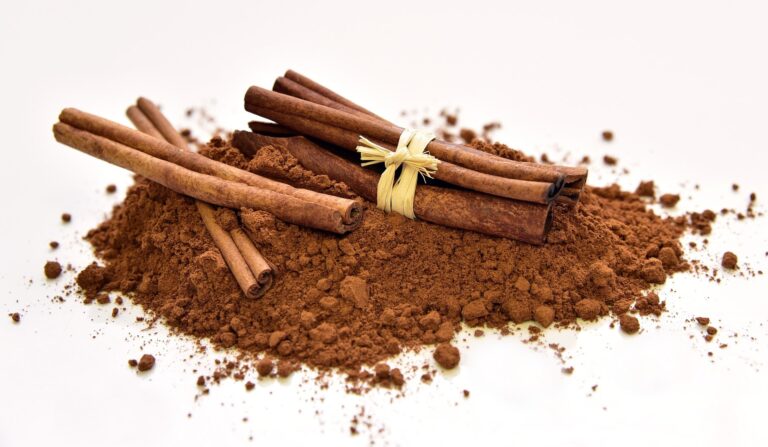Cinnamon

Cinnamon is an evergreen tree with a variety of medium-sized varieties that grow in a number of locations in the East such as Sri Lanka, China, Vietnam and Indonesia. The cinnamon spice is produced from the trunk of the tree and is extracted from medium-sized tree. Cinnamon has a sweet spicy taste and is used mainly for seasoning cakes and desserts and in various dishes.
Common species:
- Ceylon Cinnamon (Ceylon) – named after Ceylon (now called Sri Lanka), the place of origin of the tree and is considered the finest.
- Chinese cinnamon (Cassia) – redder in color and spicier in taste.
- Vietnamese Cinnamon (Royal) – Also called Saigon Cinnamon after its city of origin in Vietnam. It is sweeter and less spicy.
- Indonesian Cinnamon (Burmanni) – comes from Indonesia and is very commonly used in the world, with a more delicate taste.
Cinnamon is used as a spice. Its taste is sweet and it has a certain spiciness. It has been used as a medicinal plant in folk medicine since ancient times and has been used as a remedy for sore throats, stomach aches, sugar problems and joint pain.
It contains special phenolic compounds, flavonoids and antioxidants. Has strong anti-inflammatory, anti-diabetic, anti-microbial properties. Strengthens the immune system and protects against cancer and heart disease. Cinnamon contains about 250 calories (per 100 g), carbohydrates, fats and some protein. In addition, it contains important vitamins and minerals like calcium, sodium, iron, vitamin C, potassium, phosphorus, magnesium, zinc, vitamin B, E and K and folic acid.
It can be consumed in powder, oil or extract. Cinnamon has many studies that strengthen the understanding of its healing properties.
Known medicinal properties of cinnamon:
- Helps in dealing with diabetes
Has an anti-diabetic effect, helps balance sugar levels by increasing the body’s sensitivity to insulin and thus allows the body to balance the it’s sugar levels. Cinnamon acts as an active blocker for the enzyme alanine transaminase which allows the sugar to be absorbed into the blood and become energy and thus helps lowering blood sugar levels especially after a big meal.
- Cardiovascular health
Cinnamon helps with a variety of risk factors related to heart health like lowering cholesterol (LDL) levels in the blood, lowering blood pressure and lowering blood triglyceride levels. It stimulates blood circulation and the body’s ability to repair tissue (especially heart tissue). It has been found to be very effective in aiding blood clotting and thus prevents bleeding.
- Anti-inflammatory
Cinnamon is rich in flavonoid compounds with anti-inflammatory properties and in aiding various neurological disorders like Parkinson’s, Alzheimer’s caused as a result of inflammatory processes. It also helps in delaying the production of nitrogen oxides in the body which makes it effective in treating the gastritis problems.
- Infections of bacterial, fungal and viral origin
It has anti-microbial, anti-parasitic, anti-bacterial and antiviral properties. It helps strengthen the digestive system and helps with a wide range of infections and inflammation in the stomach and urinary system.
- Improves concentration and raises energy
Cinnamon has the ability to help the body regulate sugar levels and proper breakdown of sugars. Allows efficient work of the body and improves energy levels and vitality. It enhances concentration especially in monotonous activities or in activities that require a high level of concentration like learning. - Helps with weight loss
In addition to its abilities related to balancing blood sugar levels it contains an active ingredient called cinnamaldehyde which may help in weight loss and especially in reducing belly fat.
- Strengthening the immune system
It contains active ingredients such as terpenoids, diterpenes, coumarin and cinnamaldehyde which are known to help strengthen the immune system.
The more common cassia cinnamon has a high concentration of a substance called coumarin which can damage the liver in high doses. In daily use as a spice, it is difficult to reach quantities that can be harmful, but when using as an extract, it is recommended to use Ceylon cinnamon, which contains almost no coumarin.
Cinnamon is a plant with a wide range of medicinal properties and it is also used as a spice that adds a wonderful sweet and a gentle spicy taste. It is beneficial both for external use on the skin and for internal use. Incorporate cinnamon into your daily diet in cooking, extract or beverages.
To read more about herbs and their special properties click here.

